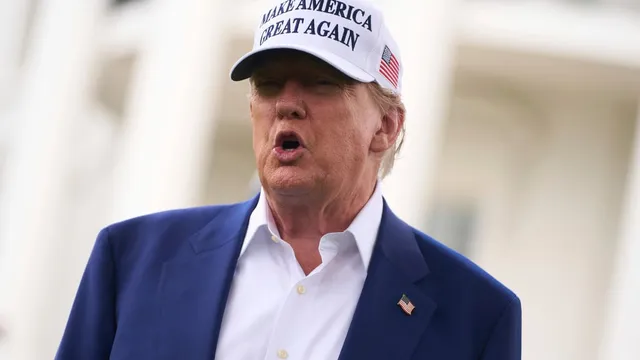
Trump thanks Iran for early warning about missile strikes on U.S. base
2025-06-24 11:12- President Trump confirmed Iran's early warning about the missile strikes on the Al Udeid Air Base in Qatar.
- The situation unfolded as a reaction to U.S. strikes against Iranian nuclear facilities, leading to minimal damage and no casualties.
- This incident highlights the complex dynamics in U.S.-Iran relations, emphasizing the need for ongoing peace efforts.
Express your sentiment!
Insights
In a recent series of events, President Donald Trump confirmed that Iran provided early notice regarding missile strikes on the Al Udeid Air Base, which is located in Qatar. The strikes were a response to U.S. bombings on three Iranian nuclear facilities that occurred on June 22, 2025. The information relayed by Trump indicated that these strikes were planned and expected, ultimately resulting in no American or Qatari casualties, or significant damage to the base itself. Trump used his social media platform to express gratitude towards Iran for the early warning, which he stated enabled the U.S. military to minimize damage and avoid any loss of life. He also characterized the missile attack as a weak response to the prior U.S. airstrikes. Remarkably, most missiles fired at the Al Udeid base were intercepted, showcasing the effectiveness of U.S. defenses in the region, despite heightened tensions following the recent airstrikes. Moreover, Trump's post revealed broader implications, suggesting that diplomatic communications might have influenced Iran's military strategy. He commented that the advance notice from Iran mirrored past events, particularly a similar occurrence in 2020 when Iran warned Iraq of impending missile strikes as retaliation for the U.S. drone strike on Iranian military leader Qassem Soleimani. In both cases, this advance warning resulted in no casualties among U.S. personnel. In the immediate aftermath of these tensions, Trump announced a ceasefire agreement that he claimed was reached between Israel and Iran, indicating a shift towards decreased military hostilities in the region. He emphasized the importance of maintaining peace and harmony in relation to diplomatic negotiations around Iran’s nuclear program. The situation remains dynamic, with ongoing deliberations about the potential for conflict or resolution in the Middle East, illustrating the ongoing complexity of U.S. relations with both Iran and Israel.
Contexts
As of June 2025, the state of U.S.-Iran relations remains complex and tense, shaped by a series of geopolitical events, diplomatic efforts, and ongoing regional conflicts. Since the reimposition of sanctions by the U.S. in 2018, Iran's nuclear program has progressed, leading to heightened concerns from both the U.S. and its allies regarding potential nuclear proliferation. The negotiations surrounding the Joint Comprehensive Plan of Action (JCPOA) have consistently faced hurdles, with both sides accusing one another of non-compliance and political posturing. The situation has been further complicated by Iran's support for proxy groups in the Middle East, which the U.S. views as a destabilizing influence in the region, exacerbating tensions between the two nations. Furthermore, the domestic politics of both countries have played a significant role in shaping their foreign policies, often leading to setbacks in diplomatic engagement. In 2024, a series of indirect negotiations took place, marked by fluctuating levels of engagement from both sides. While there were moments of optimism, such as backchannel communications and periodic meetings involving European intermediaries, these efforts did not lead to substantial progress towards a new agreement or the revival of the JCPOA. The U.S. has emphasized a need for a comprehensive approach that addresses Iran's nuclear ambitions, its missile program, and its influence in regional conflicts, alongside its support for groups like Hezbollah and the Houthis. Iran, on the other hand, has sought relief from sanctions and recognition of its regional role, complicating the negotiation landscape. Public sentiment in both countries remains marked by skepticism and distrust. In the U.S., public opinion is shaped by concerns over national security, particularly related to Iran's missile capabilities and regional activities. Simultaneously, the Iranian populace has experienced significant socio-economic difficulties due to sanctions, leading to internal dissent and calls for the government to adopt a more conciliatory foreign policy. As both nations navigate their domestic challenges, the potential for any major breakthrough in relations remains uncertain. In the background, tensions threaten to escalate, especially with incidents involving U.S. naval forces in strategic waterways and Iran's ongoing military exercises, which the U.S. perceives as provocations. Looking ahead, the future of U.S.-Iran relations may hinge on developments in both countries' political landscapes and the shifting dynamics of international diplomacy. The Biden administration aims to reinvigorate multilateral talks, yet the response from Tehran remains guarded amid hardline factions within its government. Furthermore, the involvement of other regional players, including Gulf states and European nations, will be crucial in mediating discussions and fostering an environment conducive to dialogue. As of late June 2025, the potential for a renewed agreement exists but will require sustained diplomatic efforts, mutual concessions, and a recalibration of both nations' strategic priorities.